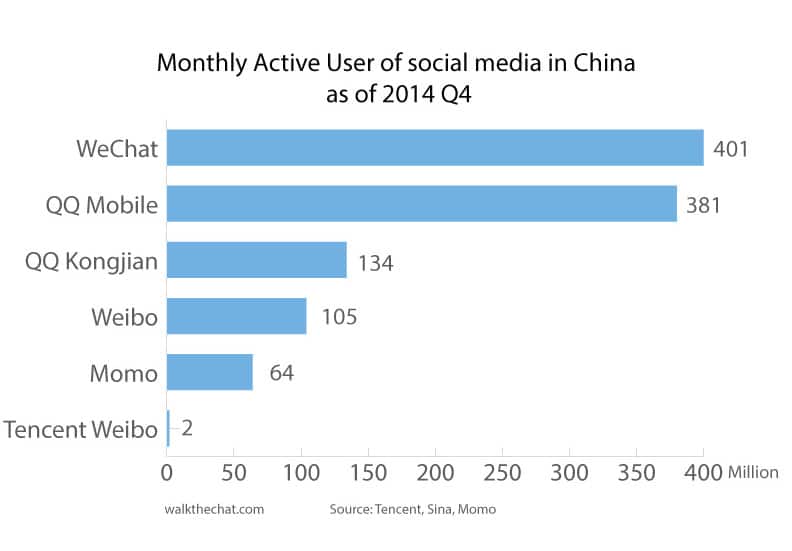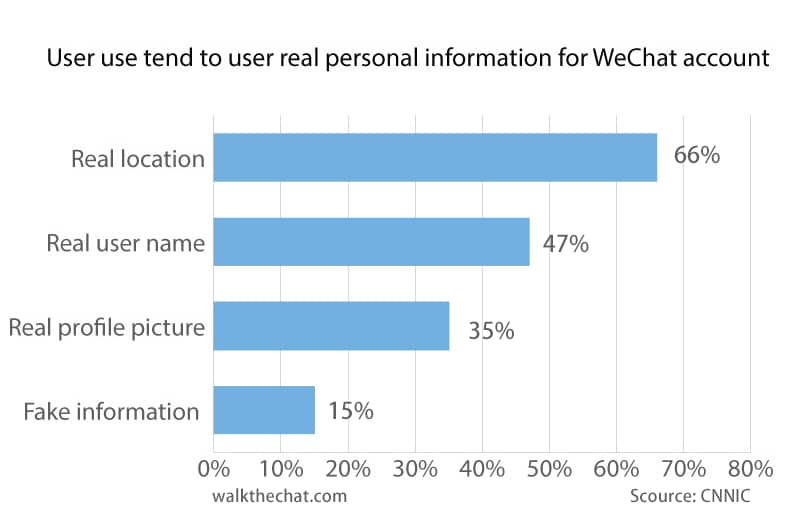 The above chart is the list of monthly active users of social networks in China. WeChat has 4 times more monthly active users than its closest (non-Tencent-owned) competitor, Weibo. Why is WeChat different from other social networks in China?
The above chart is the list of monthly active users of social networks in China. WeChat has 4 times more monthly active users than its closest (non-Tencent-owned) competitor, Weibo. Why is WeChat different from other social networks in China?
1. WeChat is relationship oriented
Compared with Weibo and Twitter, which are “interest based networks”, WeChat connects you with the people who are closest to you rather than with stars or companies. Because of this intimate relationship with other followers, the connection is a lot stronger on WeChat and increases the amounts of shares, reads and interactions compared to other networks.
Users also tend to “reveal” themselves more on WeChat than on other social networks, because of this perceived feeling of safety.
A survey by CNNIC shows that almost half of the WeChat users use their real name on their account, and over 35% of them use a real profile picture.
2. WeChat users’ stickiness is high.
According to the latest Tencent data, 55% of users open WeChat more than ten times per day. This is partly linked to the variety of functions WeChat provides, from the most basic messaging and photo sharing functions to WeChat payment, gaming and much more.
3. WeChat is a platform
Unlike most other social network site which focus on one specific use-case, WeChat is trying to be a super platform, by integrating WeChat with all industries, including the most traditional industries. WeChat is in this sense more than an APP: it is a new ecosystem.
Tencent is paving the way for what is now a main focus on Chinese government: Prime Minister Li Keqiang announced the new “Internet Plus” action plan during the National People’s Congress earlier this month. This “Internet Plus” plan was put forward by Tony Ma, Chairman of Tencent, with the focus to use technology to change all industries. With the support of the government, Tencent is now pushing the new ecosystem that evolves and revolves around WeChat. In this recently released video, Tencent shows how WeChat can be used in travel, food & beverage, hospital & medical care industries…
4. WeChat users consume more content than on most other APPs.
On Weibo, each message is limited to 140 character. WeChat is a great tool for browsing more extensive content. WeChat users already took the habit of reading news and sharing interesting articles on their moments and from Official Accounts they follow. Tencent also encourages better content by forbidding incentivised sharing and by enforcing strict copyright for unique content, so that users should only share a piece of content if they feel like it, and so as to avoid copycat accounts.
5. WeChat users are more likely to spend money on official WeChat account.
With 60% of user spending higher than 10 RMB per month. Companies selling lower cost products can leverage WeChat users’ buying habit to market their goods. And companies with more complicated service or higher priced products, 500 RMB or more, can use WeChat as a initial landing page to introduce products or services. WeChat can then be used for users to content agent who would support a more complex, multi-channel sales process
Conclusion
WeChat’s success is unique in the history of Internet software: it achieved a monopoly position without benefiting from a first-mover advantage. Competing against other players, including Tencent-owned QQ (in a great example of voluntary product cannibalisation), it managed to become the must-use APP in China.
The success of WeChat relies on its careful balancing of privacy and enterprise-friendliness. It is taking extreme care to protect its users, while giving them access to a variety of services from companies. Enterprises who understand this paradigm and manage to adapt to it will come out first in the battle for visibility on China’s largest social network.





